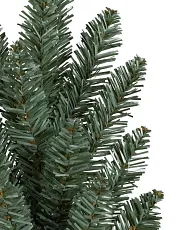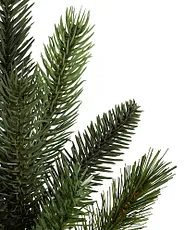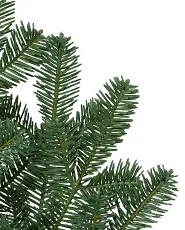At Balsam Hill, we design different types of Christmas trees that cater to your needs and preferences. Whether it’s a realistic polyethylene (PE) Christmas tree that resembles your favourite evergreen or a polyvinyl chloride (PVC) one that combines quality and affordability, we have you covered. Find the best style for you in this guide.
What’s the Difference Between PE and PVC Trees?
While artificial trees may seem similar from afar, a closer look will show a substantial difference in Christmas tree material, fabrication, and durability. Artificial Christmas trees can be categorized in two ways by the materials used: standard PVC and ultra-realistic PE.
What Is a PVC Christmas Tree?
Artificial Christmas trees used PVC needles when they were first introduced. This material is hard-pressed into thin pieces, then cut into fine, rectangular needle-like strips. The strands are then twisted between two strings of wire to outline the tree branches. Their needles are often flat and look unrealistic but because they are inexpensive, they became a popular alternative to natural trees.
What Is a PE Christmas Tree?
PE was introduced several years later and is now the preferred material for replicating the look of real trees. Elaborate patterns are moulded and infused with PE using actual conifer tree branches, resulting in a realistic-looking tree. Unlike PVC Christmas trees, the needles of PE trees have the shape, thickness, and mass of a true tree branch.
Needle Types
Inspired by various types of real Christmas trees, many artificial trees use PVC and PE needles for their foliage. Learn the differences each material brings in realism and practicality.
Levels of Realism
Most realistic artificial trees feature a combination of PVC and PE needles. Balsam Hill Christmas trees are categorized into three levels of realism:
Colour
Like real trees, Balsam Hill trees come in different shades of green depending on the tree species. We also offer frosted and White Trees to suit special Christmas tree decorating themes.
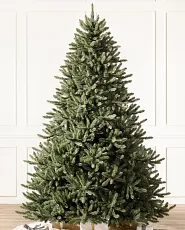
Green
Our best-selling green Christmas trees take after the varied hues of your favourite evergreens. Some have medium green tips, while others feature a combination of dark and light green foliage. A few of our trees are also multi-toned with dark green tips and silver undersides or blue-green and silvery needles.
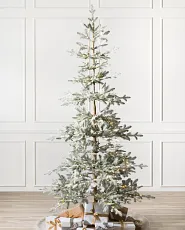
Frosted
Inspired by the wintry outdoors, our frosted Christmas trees are flocked with light layers of artificial snow. They feature the same Classic Needle and True Needle foliage as the rest of our trees.
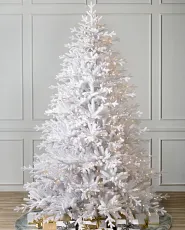
White
An alternative to traditional green trees, white foliage is a versatile backdrop for unique ornaments and playful themes. Decorate for year-round occasions such as Easter, birthday parties, sporting events, and more.
Frequently Asked Questions
Below we answer more of your questions about artificial Christmas trees.
What Is the Difference Between Real and Artificial Christmas Trees?
Artificial Christmas trees are made with plastic needles and metal faux trunks, offering you the convenience of an easier setup and upkeep, as you and your family enjoy a beautiful tree throughout the season. Meanwhile, real trees require cutting down, mounting, and cleaning up of fallen needles. They also usually last for four to five weeks, while artificial ones can last for years.
Is It Better to Have a Real Christmas Tree or an Artificial One?
Real and artificial Christmas trees have different benefits and disadvantages. Natural evergreens are less expensive and give off that classic Christmas scent, but they require more maintenance and only last for a few weeks. Artificial trees, on the other hand, are more convenient, safe, and cost-effective in the long run.
What Is the Most Realistic Type of Christmas Tree?
Most of Balsam Hill’s Most Realistic Christmas trees feature True Needle technology that helps replicate the branch design, color variations, and overall feel of real evergreens. The BH Fraser Fir is our most realistic Christmas tree to date. From its five-split forked tips, rich green needles with silver undersides, full silhouette, and organic treetop, we’ve made every effort to make it look and feel like its natural counterpart.
What Are the Cons of Having an Artificial Christmas Tree?
Artificial trees are more expensive upfront, but they are more cost-effective in the long run since you can reuse them year after year. Faux Christmas trees also use plastic materials that aren’t recyclable.
We hope this helps you find the Balsam Hill Christmas tree that’s right for you. Want to see and feel the branches for yourself? Purchase our Branch Sample Kit to compare actual branch clippings in the comfort of your home. Read our guide on How To Choose a Tree Using the Balsam Hill Branch Sample Kit to know more.
Learn More About Artificial Trees
Here are other resources to help you find your perfect Christmas tree.


